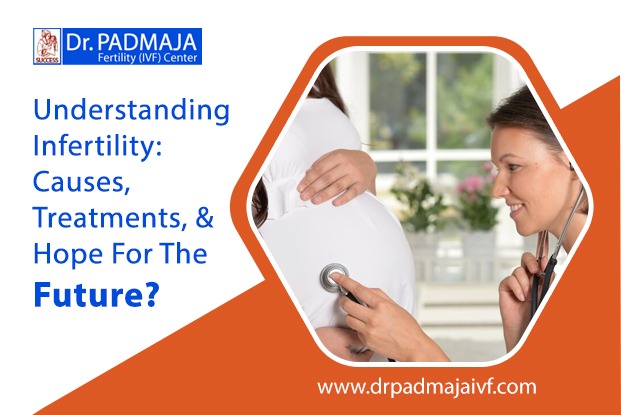Many couples throughout the world are becoming increasingly concerned about infertility. The emotional toll, coupled with the uncertainty of treatment options, can make the journey toward parenthood seem overwhelming. However, advancements in fertility medicine have brought hope to many couples struggling with infertility. By understanding the causes, available treatments, and where to seek expert care, you can take the first step toward realizing your dreams of parenthood. In this blog, we explore the causes of infertility, the treatments available, and how top fertility centers like the best IVF center in Hyderabad, specifically Dr Padmaja IVF Center, are making a difference.
What is Infertility?
Infertility is commonly defined as the inability to conceive after one year of regular, unprotected sex. While this issue is typically thought of as affecting women, male infertility accounts for about 40-50% of infertility cases. Fortunately, advancements in fertility treatments and technologies have made it possible for many couples to conceive despite infertility challenges.
Common Causes of Infertility
1. Female Infertility
Numerous causes can contribute to female infertility, such as:
Ovulation Disorders: Conditions like Polycystic Ovary Syndrome (PCOS) and thyroid disorders can disrupt ovulation, making conception difficult.
Blocked Fallopian Tubes: Damage or blockage in the fallopian tubes, often due to infections or endometriosis, can prevent the egg and sperm from meeting.
Age: As women age, the quality and quantity of eggs decline, particularly after the age of 35, making conception more challenging.
2. Male Infertility
Male infertility is just as common as female infertility and can be caused by:
Low Sperm Count: A reduced number of sperm lowers the chance of fertilizing the egg.
Poor Sperm Quality: Even with a normal sperm count, poor sperm motility (movement) or abnormal shape can make it difficult to conceive.
Varicocele: A condition where veins within the scrotum enlarge, affecting sperm production and quality.
3. Unexplained Infertility
In some cases, no specific cause of infertility can be identified, which is referred to as unexplained infertility. This can be particularly frustrating, but it doesn’t mean there is no hope. With the right treatments, many couples with unexplained infertility have gone on to conceive successfully.
Fertility Treatments Available
If you’re struggling with infertility, there are several treatment options available that can help increase the chances of conception. Among the most popular therapies are:
1. Intrauterine Insemination (IUI)
During ovulation, IUI entails injecting the woman’s uterus with specially prepared sperm. This treatment is typically used for mild male infertility or unexplained infertility.
2. In Vitro Fertilization (IVF)
IVF is one of the most effective treatments for a variety of infertility issues. It entails causing the ovaries to produce a large number of eggs, extracting those eggs, and fertilizing them outside. The embryos are then transferred into the uterus for potential implantation. IVF is commonly used for women with blocked fallopian tubes, severe male infertility, or those with unexplained infertility.
If you’re considering IVF, choosing the best IVF center in Hyderabad, like Dr Padmaja IVF Center, is crucial. Known for its high success rates and compassionate care, Drpadmaja Fertility Center provides state-of-the-art IVF treatments, guided by the expertise of Dr. Padmaja, one of the most respected fertility specialists in Hyderabad.
3. Intracytoplasmic Sperm Injection (ICSI)
ICSI is an advanced technique often used when male infertility is a factor. In ICSI, a single sperm is injected directly into an egg to facilitate fertilization, ensuring that even sperm with low motility or abnormal morphology can successfully fertilize the egg.
4. Egg and Sperm Donation
If either partner has issues with egg or sperm quality, egg or sperm donation may be considered. Donated eggs or sperm are fertilized via IVF, and the resulting embryos are implanted into the woman’s uterus.
5. Surrogacy
Surrogacy might be an alternative for women who are medically incapable of carrying a pregnancy. In surrogacy, another woman carries the pregnancy, using either the couple’s embryos or donor eggs/sperm.
Why Choose Dr Padmaja IVF Center?
When it comes to fertility treatments, choosing the right fertility center is key. Dr Padmaja IVF Center is considered one of the best IVF centers in Hyderabad, thanks to its personalized approach and high success rates. Dr. Padmaja is a renowned fertility specialist with years of experience helping couples overcome infertility. The clinic uses the latest technologies and offers a full range of fertility treatments, including IVF, IUI, and egg freezing, all under one roof.
At Drpadmaja Fertility Center, each patient receives individualized care, ensuring that treatments are tailored to their specific needs and challenges. With a warm and compassionate team, Dr. Padmaja’s center provides the emotional and medical support necessary for couples to successfully navigate their fertility journey.
Hope for the Future
While infertility can be a difficult and emotional experience, it’s important to know that there is hope. With advancements in fertility treatments and the expertise available at centers like Dr Padmaja IVF Center, many couples who once felt hopeless are now building families of their own. If you’re struggling with infertility, don’t lose hope. The right treatment and support can help make your dream of parenthood a reality. Reach out to Drpadmaja Fertility Center for a consultation and take the first step toward your future as a family.
About The Author :

If Dr. Padmaja Divakar is a public figure or a professional in a specific field, I recommend checking her official website, professional profiles, or reliable online sources for the most up-to-date and accurate information about her background, qualifications, and achievements.
Frequently Asked Questions (faqs)
1.How long should I try to conceive before seeking help?
For women under 35, it’s generally recommended to try for at least one year before seeking help. For women over 35, it’s advised to see a doctor after six months of trying.
2.Can stress affect fertility?
While stress alone is unlikely to cause infertility, it can interfere with the hormonal balance needed for ovulation and sperm production. Managing stress through relaxation techniques, exercise, and therapy can improve overall health and fertility.
3.Are there natural ways to improve fertility?
Certain lifestyle changes, such as maintaining a healthy weight, eating a balanced diet, avoiding smoking and excessive alcohol, and managing stress, can support fertility. However, for medical conditions causing infertility, professional treatment is usually required.
4.How successful are fertility treatments like IVF?
IVF success rates vary depending on factors such as the woman’s age, the cause of infertility, and the clinic’s success rates. Success tends to be higher in women under 35, but advances in IVF techniques have improved outcomes for older women as well.
5.Is infertility always a permanent condition?
Not always. Many causes of infertility are treatable or manageable. Even for women or men with certain conditions like PCOS or male infertility, treatments like medication, surgery, or assisted reproductive technologies (ART) can significantly improve the chances of conception.

